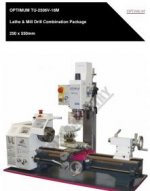Hi guys, I'll try keep this short.
Last year I completed a 6 month machining pre-apprenticeship course after having done an unrelated degree, and have since been looking for an apprenticeship. 6+ months later and I'm still looking. I'm working in the meantime (pick packer in a warehouse) and would like to buy a small lathe or mill at home so I can practice and keep my skills sharp. I'm turning 25 next month so I'm entering this trade pretty late (others my age already have 8+ years of experience) and would like to get right into it and learn as much as possible. I'd like to get something nice and solid but not too expensive, under $3000 AUD if possible. My questions:
1) What would you recommend for a first machine, a lathe or a mill (or possibly a combo like the picture below)? Are there any specific machines you'd recommend?
2) Do you have any recommendations for beginner projects that can be done on a small machine? The goal is to practice and learn some new skills, but I'd also like to make things to give/sell to friends or online.
3) What other essential tools do I need, and approximately how much would this set me back? Mics, calipers, etc.
4) Where can a hobbyist source metal for projects?
5) Are there any books/guides/resources you'd recommend for a beginner?
Any help or advice at all is appreciated. I'm very new to this and would like to learn.
Thank you.

Last year I completed a 6 month machining pre-apprenticeship course after having done an unrelated degree, and have since been looking for an apprenticeship. 6+ months later and I'm still looking. I'm working in the meantime (pick packer in a warehouse) and would like to buy a small lathe or mill at home so I can practice and keep my skills sharp. I'm turning 25 next month so I'm entering this trade pretty late (others my age already have 8+ years of experience) and would like to get right into it and learn as much as possible. I'd like to get something nice and solid but not too expensive, under $3000 AUD if possible. My questions:
1) What would you recommend for a first machine, a lathe or a mill (or possibly a combo like the picture below)? Are there any specific machines you'd recommend?
2) Do you have any recommendations for beginner projects that can be done on a small machine? The goal is to practice and learn some new skills, but I'd also like to make things to give/sell to friends or online.
3) What other essential tools do I need, and approximately how much would this set me back? Mics, calipers, etc.
4) Where can a hobbyist source metal for projects?
5) Are there any books/guides/resources you'd recommend for a beginner?
Any help or advice at all is appreciated. I'm very new to this and would like to learn.
Thank you.




